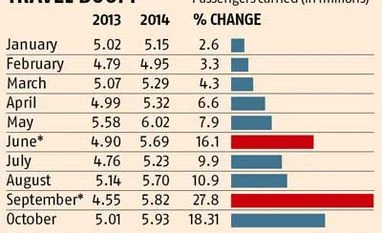The eight scheduled airlines together carried 5.93 million passengers in October, an increase of 18.3 per cent over the 5.01 million in the same month of last year. The number was also the second highest in absolute terms this year. In May, the eight airlines had seen air traffic rise a combined 7.9 per cent over a year before, to 6.02 million passengers.
Budget carrier IndiGo continued to maintain a strong lead in the domestic market; nearly one of every three travellers fly with it. IndiGo’s market share, however, dipped marginally to 31.9 per cent last month from 32.8 per cent in September.
Air India grew its market share by almost three basis points during the month. With 19.5 per cent in October, AI was the second largest carrier in market share in domestic skies.
Jet Airways, with low-cost arm JetLite, accounted for 20.5 per cent of the domestic air travel market, marginally lower than the 20.8 per cent the duo had in September. SpiceJet and GoAir had 17.3 (down from 18.6 in September) and 8.5 per cent (down from 9.2 per cent), respectively. Newcomers Air Costa and AirAsia India’s shares were each 1.1 per cent.
AI’s passenger load factor (PLF, a measure of seats used) was the highest in October, at 83.5 per cent. The government-owned carrier had merged several flights during the month to improve loads and use aircraft more optimally. Its PLF had been 76.7 per cent in September.
SpiceJet, which has initiated a series of flash sales this year to fill unused inventory, was second in PLF with 80.1 per cent. Regional carrier Air Costa came third with 78.1 per cent.
IndiGo maintained its reputation for best on-time performance – 92.8 per cent of its flights were on time from the country’s four privately operated airports. GoAir came second, with on-time performance of 87.5 per cent. SpiceJet was third, with 83.3 per cent of flights on time. Jet and JetLite managed 80.1 per cent. Least impressive on this was AI, with only 63.3 per cent of its flights.
Passengers carried by domestic airlines between January and October this year totalled 55.07 million as compared to 50.07 million in the same period last year, growth of 8.6 per cent.
)